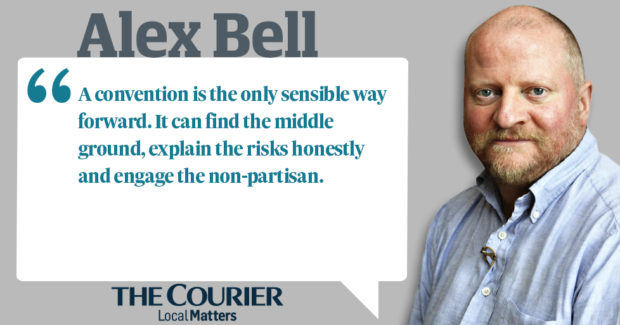Next year will mark the centenary of the partition of Ireland, a political stitch-up intended to create two devolved parts of the UK which ended in the independence of the south and the sectarian issues of the north.
Not, then, a success.
The current exercise in leaving one union, the European Union, while trying not to further split Britain is going no better.
No plan in advance, an overly simplistic assessment of Britain’s worth and politicians selected on the basis of loyalty to a nationalist cause (Brexit) has proved a poor strategy.
The overwhelming lesson is: know what you are doing in advance, which translates as a constitutional convention, just like the one planning for devolution in the 1990s.
Going to that convention was exciting. It felt somehow revolutionary. Here sat grandees in dark suits and blue Crombies planning a government in Edinburgh.
Gordon Brown began this year calling for another “constitutional revolution” in January. As of this month, he was in charge of a Labour and Liberal Democrat-run wheeze. According to a letter sent to Downing Street explaining its purpose “the current relationship between our central government and the constituent parts of the UK is incoherent, often unjust, and ultimately unsustainable”.
All of which sounds very interesting but for one important point. The letter says the convention aims to “save the United Kingdom”. Not an open-minded inquiry then, so much as a political device to stop independence.
This is a great pity, as we desperately need a cross-party understanding of all options.
The SNP are not hostile to a convention – here is the constitution minister Mike Russell in February: “I will be inviting members to participate in a new constitutional convention, which will aim to secure a consensus across society on Scotland’s right to choose.”
Murdo Fraser, for the Scottish Tories, suggested this was “just a back-of-a-fag-packet notion that has been dreamed up to placate the pro-independence fanatics on the SNP backbenches”.
You might think that’s a score draw on constitutional conventions and leave it there but that would be a pity.
A convention is the only sensible way forward. It can find the middle ground, explain the risks honestly and engage the non-partisan – precisely what Brexiteers failed to do.
Unionists could make a case for more powers for Scotland and greater federalism, while the resources of the UK can be harnessed to make the independence case. If Nats are confident about their thinking, why delay testing it in a UK forum? After all, that will be the first thing to happen should Scotland ever vote Yes.
It’s important to remember any referendum must come from power-holding Westminster. Therefore, the idea independence is purely a Scottish matter is false. It’s for Scots to decide but the reality will be a deal brokered between all parts of these islands.
That is something Indy supporters must accept, much as Brexiteers have to accept some compromise with the EU.
It isn’t a weakness, just realpolitik. Therefore at some point – better now than later – we need to thrash out what’s acceptable to both parties.
As an Indy supporter, my faith in the SNP getting it right is pretty much exhausted. I worry for a nation choosing the option on false promises. It sounds like a classic Scottish self-inflicted injury.
The morning after, when Sturgeon ’fesses up to cuts and we have no one else to blame, has all the makings of a 50-year-long self-loathing session.
Yet I’m confident enough in the idea to see it holding its own against federalism or the status quo.
It’s not that Labour is entirely hostile and for Johnson’s Tories, you’d think it was a winner. Respond to the growing support for independence in Scotland and the general hubbub for change with a convention and make the terms of any referendum defined by the outcome.
But that analysis ignores the UK Government’s Internal Markets Bill, its own sordid act of stitch-up.
The Tories want UK reform but according to their post-Brexit interests only. All of which leaves the most sensible option permanently on the table but never to be agreed between three vested interests.
A hundred years on from the partition of Ireland we make the same mistakes, driven by the same self-interest.
In the short term, the politicians gain. In the long term, we’ll all pay the price.


